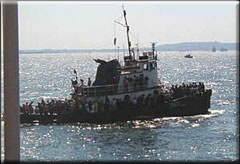Some thoughts following Apple's lawsuit and questionable iPhone 5 features.
Whenever the Dalai Lama passed on in Tibet, the Lamas went out in search of a reincarnated soul.
Should Apple consider the same thing?
Face it, Apple without Jobs looks a little less magical
by the day. Like the Teflon peeling off an old pan, without the talent and charisma
of this one man, you see what’s beneath the surface and it looks pretty base.
The iPhone without Google Maps is deficient since it is one
of the most used features in smartphones with its turn-by-turn directions. Apple aficionados will work around it
just as they accepted 3G when everyone else had 4G. The thing about genius is
that it has certain trajectory – as long as people think breakthroughs are
still coming, they forgive everything.
So it is with Jobs’ legacy. For now.
When Apple sued its competitor, Samsung, for infringement,
the Apple devotees cheered. Closer examination showed these were
not utility, but the weaker, design patents, and a hometown jury handed Apple a
big victory over such laughable innovations as a “rounded rectangle.”
With Jobs at the helm, his followers would have seen this as
the ultimate validation. Jobs had made clear his willingness to undertake “thermonuclear
war.” But we can expect years of appeals and with a phalanx of lawyers and generally anonymous executives in
command, Apple is starting to look like any other corporation rattling its
proprietary saber. All this in
crowdfriendly, open source world.
To make matters worse, Apple lost Jobs’ creative alter ego, Jonathan Ives, partly one supposes because Jobs treated him as his vessel in
the creation of the iPod and the iPhone, and not as his partner. As for being a successor, that never came up.
The British, of course, see him differently: he is now Sir Jonathan Ives. But
now he designs for the Android world.
The man running Apple, Tim Cook, truly was Jobs’ vessel. He
perfected Apple’s supply chain and lives a near-monastic lifestyle keeping this
marvelous temple of American ingenuity alive.
Now that we are beginning to see the implications of the post-Jobs
world – it is worth asking what really is to become of Apple? Is that a temple to grow innovation or one that will mostly remember it?
Let’s face it, Jobs was like no other exec in America. I
have met him personally and you can be sure he was different from a CEO – any CEO – as a
dictator is from an elected president. Running for office – of any kind – was
not part of his agenda. In fact, by inventing the future, Jobs was free to act like
a mid-eastern potentate from the Sheherezade or a kind of Howard Hughes of tech. His style was abrasive, his utterances
unedited, punishment could be drastic and the next result was debilitating
to most underlings. He never had to deal with labor unions and he found a way to set
his own pricing standards with margins that astounded competitors. If this were
anyone else, we would be talking about a price gouger. But somehow, he was a saint.
The Jobs we know, was an icon in the religious sense
of the word. Thanks to Walter Isaacson’s biography, we know he considered himself special and that normal rules did not apply to him.
He fit the mold of a Biblical prophet - founding an industry that changed the world as profoundly as any religions while still in his
twenties, only to be sent out to the wilderness by the man he hired, John Sculley. Then you had the amazing second act where he was invited back 10 years later to save the company as it
was faltering.
This might as well have been the second coming as far as his followers
were concerned and they stuck to him just as if they had joined a cult, which indeed they
had. Like any cultist, they accepted sacrifice in the name of their leader and they forgave him when he overcharged early adopters on the iPhone –
only to suddenly drop the price on them. They overlooked the flawed the antenna of the iPhone 4,
the unchangeable batteries, the bad MobileMe and so on. They camped out for days just to buy these products and they would probably have walked on hot coals if he'd asked.
Clearly, the fanaticism lingers. But without Jobs you have to wonder if there isn't a certain deja vu - a revisiting of the era when Apple was run
by a bunch of sue-happy, no-name executives who knew their stuff but had no
magic?
Back in the 80’s when Jobs was first put to the sword, the
former Pepsi exec he hired, John Sculley, took over at Apple. He was a quick
study who realized that he needed to show his creative chops while also being a
true corporate exec. He was polished and mature where Jobs was the irascable
child. Sculley sued Microsoft for stealing the Mac interface. He won some
victories but you have only to look at any computer to see how that played out.
Sculley also created a concept product called the Knowledge
Navigator which became the Newton – arguably the futuristic prototype of the
iPhone. However, he did so at the expense of Apple’s real business – usable
computers, lightweight laptops and customer growth - and eventually he lost his job.
Apple without Jobs has a history of faltering – not at first
– but inevitably because the kind of creative spirit it required is not a
product of any Business School or Technology Institute. However, you could not work for
Apple at that level unless you had qualifications from institutions like that. So let’s not wait for
the next Jobs to show up at Apple’s Human Resources department anytime
soon. His or her resume may be in the mail but it won't be read.
So there’s the dilemma, should Apple look for an innovator
who is willing to risk being a bad exec but a charismatic technology leader, or pick a qualified
CEO who will sacrifice good governance in pursuit of innovation?
Or should Apple find a reincarnation of Jobs?
Hint: he or she, is out there - but probably starting
their own company.
Question: if Apple discovered them, would they try to hire them or put them out of business?







